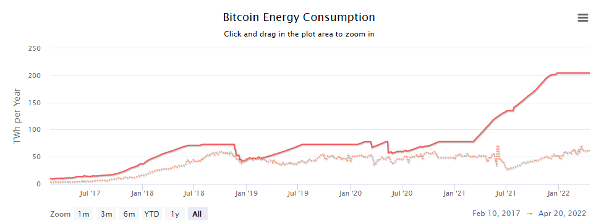Bitcoin a figyelem középpontjában
A zöld gazdaságról szóló vitákban a legtöbbet emlegetett kriptopénz a Bitcoin, amely a Coinmarketcap.com még mindig több mint 40 százalékos piaci dominanciával rendelkezik, és jelenlegi értéke valamivel több mint 37 000 dollár. Különösen a Bitcoinról sokan negatívan nyilatkoztak az elmúlt években, mivel a bányászata során évente 40 millió tonna szén-dioxidot bocsát ki a légkörbe. Csak a Bitcoin-tranzakciók során felhasznált energia mennyisége is jelentős. Egy átlagos tranzakció több mint 1700 kWh villamos energiát "éget el", ami közel kétszerese egy átlagos amerikai háztartás havi fogyasztásának. Hogy még jobb képet kapjunk - a Digiconomist szerint egy Bitcoin ugyanolyan szén-dioxid-kibocsátással jár, mint 1 879 709 Visa-tranzakció.
A fókusz Kínából Amerikára tevődött át
Talán részben a fent említett energiaintenzitás miatt jelentősen növekvő számú amerikai bányász olyan új üzleti stratégiákat dolgoz ki, amelyekkel csökkenthető a leghíresebb kriptovaluta negatív környezeti hatása. Az Egyesült Államok kongresszusa nemrégiben megvitatta, hogyan lehetne hozzájárulni a zöldebb kriptopénz-bányászathoz. A legégetőbb kérdés az volt, hogy kizárólag megújuló erőforrásokat használjanak-e a Bitcoin bányászatához, vagy más, kevésbé energiaigényes blokkláncokra koncentráljanak. A lépés logikus következménye annak, hogy az USA a kriptopénz-bányászat új epicentrumává vált a világon, miután Kína tavaly betiltotta a kriptopénz-bányászatot, noha világelső volt benne.
A számok magukért beszélnek
A bitcoin-hálózat energiaszerkezetéről és szén-dioxid-kibocsátásáról szóló új, az Elsevier Joule 2022. február 25-i számában megjelent Revisiting Bitcoin's carbon footprint című kutatás eredményei azt mutatják, hogy a bányászat tavalyi kínai visszaszorítása nemcsak a bitcoinhoz kapcsolódó globális bányászati tevékenységet rázta meg, hanem jelentősen csökkentette a hálózatot a bányászat során tápláló megújuló erőforrások felhasználását is 41-ről.6%-ról 25,1%-ra csökkent. Az ok nagyon egyszerű. A nyári hónapokban, az esős évszakban a kriptopénz bányászok hozzáférhettek a kínai vízerőművekhez, amit elvesztettek, amikor betiltották a bányászatot az országban, és kénytelenek voltak az USA-ba vagy Kazahsztánba költözni. Mivel ezek az országok több szénből és gázból származó áramot szolgáltatnak a bányászoknak, a Bitcoin-bányászat szénlábnyoma megnőtt, a tanulmány becslése szerint 17%-kal. Ezek az adatok tehát arra utalnak, hogy a Bitcoin az utóbbi időben jelentősen kevésbé "zöld" lett, mint korábban bármikor.
A fogyasztási index emelkedik
A Bitcoin fogyasztási index mindig a legfrissebb becslést adja a Bitcoin-hálózat teljes fogyasztásáról. Ez idén április 20-án 204,50 terawattóra (TWh) volt. Egy évvel korábban ugyanekkor még csak 103,78 TWh volt. Öt évre visszatekintve a fogyasztás mindössze 10,2 TWh volt. Ezzel összefüggésben azonban fontos megjegyezni, hogy az energiafogyasztás a bányászok növekvő számának köszönhetően is növekszik. Jó hír a klímaszeretők számára, hogy a bitcoinok teljes száma 21 millióban van maximalizálva, és április elején már több mint 19 millió bitcoint bányásztak.

Grafikon: A Bitcoin energiafogyasztási index alakulása 2017-től 2022-ig
Zöld változás
A másik oldalon meg kell jegyezni, hogy egyre több vállalat próbálja hatékonyan felhasználni a Bitcoin-bányászat során keletkező energiát. A kanadai MintGreen bányászati vállalat nemrég bejelentette, hogy a bányászatból származó energia akár 96%-át is vissza tudja nyerni, és ennek köszönhetően a Lonsdale Energy Corporationnel (LEC) együttműködve 100 észak-vancouveri otthon fűtését tervezi segíteni. A LEC ugyanis a hagyományos földgáz helyett a megújuló energiaszektorban kereste a lehetőségeket. Emellett a MintGreen szállítási megállapodást kötött a whiskygyártó Shelter Point Distilleryvel. Ennek eredményeként a megtermelt energia nem kerül a légkörbe üvegházhatású gázok formájában.
A verseny nem marad el
Nem szabad persze elfelejteni, hogy vannak olyan kriptovaluták, amelyek lényegesen kevésbé energiaigényesek, mint a Bitcoin. Ezek közé tartozik például a Cardano vagy az Ethereum. Ez utóbbi eredetileg, akárcsak most a Bitcoin, egy Proof of Work modellel működött, amely jelentős mennyiségű villamos energiát fogyaszt. Jelenleg azonban átállnak a lényegesen energiabarátabb Proof of Stake-re.
Noha a közelmúltig a Bitcoin a bányászat során történő nagy energiafogyasztás miatt nagyon energiaigényesnek számított, mostanra kiderült, hogy ez az energia hatékonyan felhasználható. Ez hozzájárulhat a környezetre gyakorolt hatás fokozatos csökkentéséhez. Bár szén-dioxid-kibocsátását átmenetileg jelentősen befolyásolta a kriptopénz bányászatának kínai betiltása és a bányászok energiaigényesebb területekre való áthelyezése, nem kell bedobni a törölközőt. Véleményem szerint a legrégebbi kriptopénznek is megvan a helye az energiaforradalom részeként, amelynek élő tanúi vagyunk. A kriptovaluta-bányászat és a tranzakciók még mindig energia- és kibocsátási kihívásokat jelentenek, de ha a bányászok hajlandóak alkalmazkodni az új, "zöld trendekhez", a jövő kellemes meglepetéseket tartogathat számunkra. A Bitcoin így véleményem szerint továbbra is erős helyzetben van.
Olívia Lacenová, a Wonderinterest Kft. vezető elemzője